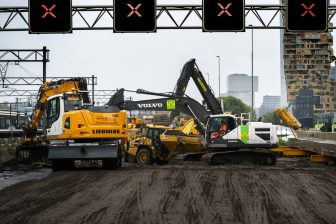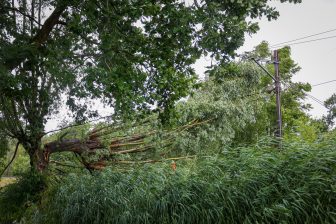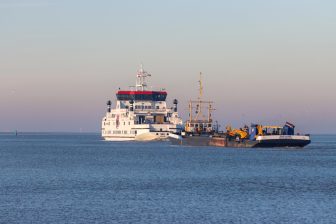ONCF and Alstom to supply 14 very-high speed trains to Morocco
Under the presidency of his Majesty the King of Morocco Mohammed VI, a contract worth nearly €400 million for the supply of 14 double-deck (Duplex) very high-speed trainsets has been signed in Tangiers on Friday, December 10, 2010 – on the Moroccan side by the Messrs. Karim Ghellab, Morocco’s Minister for roads and transport, Mohamed Rabie Khlie, managing director of ONCF, Morocco’s national railway company, and on the French side by the Messrs. Patrick Kron, Chairman & CEO of Alstom and Philippe Mellier, President of Alstom Transport. The Duplex trains are scheduled to enter commercial service in December 2015 and will run on the Tangiers-Casablanca route in the northern part of the country.
This agreement is the result of the cooperative relationship that Alstom Transport has established with Morocco’s ONCF for more than 40 years. Alstom is consequently helping the ONCF meet its objectives of providing a solution for the increase in traffic which the opening of the new Tangiers Med port will generate, further developing a high-quality rail network, freeing up capacity on the existing line to facilitate traffic flow and helping to structurally and sustainably develop the regions through which the line passes.
The Morocco Duplex trainsets will be double-deck trains designed for the ONCF and adapted for use in the operating conditions specified by the Moroccan operator along the Tangiers-Casablanca route. The trains will run at 320 km/h and at 25 kV between Tangiers and Kenitra – the first 200 km section of Morocco’s very high-speed network. Between Kenitra and Casablanca, the trainsets will run on the traditional network at speeds of 160 km/h or 220 km/h at 3 kV, depending on the running speeds set by the Moroccan operator in 2015. The very high-speed connection between Tangiers and Casablanca will reduce journey times from 4:45 hours today to 2:10 hours at the opening of the line and will carry up to 10 million passengers per year (currently 4 million).
With capacity for up to 533 passengers, each trainset will be made up of eight cars – two first-class cars, one buffet car and five second-class cars. The trains’ interior and exterior design will convey the modern, comfortable and high-quality service that the ONCF provides its passengers, together with the peace of mind. Particular attention is given to accessibility and safety, which the operator offers.
The Duplex trainsets that will be used in Morocco result from the new generation of very high-speed double-deck trains which Alstom currently produces for the French operator, SNCF. As such, they integrate all the latest developments in terms of comfort and accessibility. More than 10% of the trains’ overall capacity will be reserved for people with reduced mobility. The cars will be fitted with a bilingual French-Arabic passenger information system, including video screens. The trainsets, which are being fitted with exhaustively tried and tested standard components, will draw on all the feedback that has been received since the first Duplex came into service in 1996, particularly with regard to their reliability and operational safety, as well as how easily they can be maintained and upgraded.
The 14 trainsets will mainly be developed and built in France at Alstom Transport’s La Rochelle workshops (pilot site) and its sites in Belfort (power cars), Le Creusot (bogies), Ornans (engines) and Tarbes (traction drive), as well as Villeurbanne (electronic control system), Charleroi in Belgium, Sesto in Italy and Montreal in Canada (on-board IT and passenger information). The trainsets’ power cars and passenger cars will be delivered separately to the ONCF’s Moghogha factory just north of Tangiers, where train-set assembly operations will be carried out. Technical tests will be carried out at the Moghogha site as well as on the ONCF network before the trains come into service.
Morocco is the first country in the African continent to acquire this type of highly sophisticated railway transport infrastructure, in compliance with international standards for very high-speed rail travel. The ONCF will thus be joining the list of operators throughout the world which offer very high-speed rail services on a daily basis.
About Alstom and Very High Speed
Alstom now has nearly 30 years’ experience in very high speed rail travel. 50% of the trains now running at over 300 km/h throughout the world were manufactured by Alstom. The company’s very high speed activity is growing continually as a result of its unrivalled experience and advanced technology. Since the launch of the 1st TGV* in 1981, 670 very high speed trains have been sold worldwide. Between them they have covered over 2.5 billion kilometres (6,500 times the distance from the Earth to the moon), carried 1.5 billion passengers (25% of the world’s population), increased commercial speeds from 260 kph to 320 km/h, and have three world rail speed records to their credit: 380 km/h (1981), 515.3 km/h (1990) and 574.8 km/h (2007). Alstom is currently the only railway manufacturer with three very high-speed train platforms: the TGV Duplex (a 2-level platform), which operates daily in France at speeds of up to 320 km/h, Speedelia and the AGV** ( single level platforms). AGV was selected by NTV, Italy’s main private operator.
* TGV is a registered trademark of the SNCF
About Alstom Transport in Morocco
Alstom Morocco provides support to the Moroccan government through its three Sectors – Transport, Power and Grid – as part of a long-term partnership based on technology and sustainability. For over 40 years, the Transport Sector has been helping to make Morocco’s rail network a viable mode of freight and passenger transport for the future and a key component of the country’s growth and development. Since 1992, 27 electric locomotives have been delivered to the ONCF, Morocco’s national rail service, along with 20 Prima II locomotives since 2009. Alstom has also helped improve the Moroccan rail network by doubling the tracks on the Fez-Meknes line which has been in service since June 2007, and by modernising the signalling on 900 km of lines and at 67 stations, including the station in Casablanca. In addition, Alstom has been chosen to provide 44 Citadis tramsets for the city of Rabat-Salé and 74 of the same tramsets for Casablanca. Alstom’s role in supplying Morocco with innovative and environmentally-friendly transport solutions is also exemplified through contracts to install railway signalling and electrical power supply systems for the Casablanca tram line.
With a focus on sustainable transport, Alstom Transport develops and offers the most complete range of systems, equipment and services on the rail market. Alstom Transport is capable of managing complete transport systems, ranging from rolling stock to signalling, maintenance and infrastructure, as well as offering turnkey solutions. In 2009-2010, Alstom Transport recorded sales of €5.8 billion. Alstom Transport is present in over 60 countries and has 26,000 employees.
U las zojuist één van de gratis premium artikelen
Onbeperkt lezen? Profiteer nu van de introductieaanbieding voor € 10,- per maand.
Bent u al abonnee?



